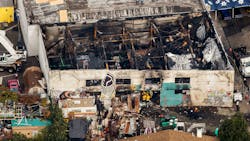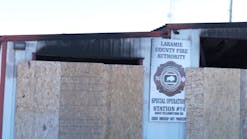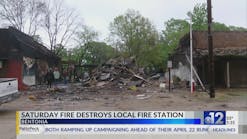CA Ghost Ship Fire Trial Ends in Acquittal, Hung Jury
By By Angela Ruggiero, David DeBolt, Ali Tadayon and Thomas Peele
Source East Bay Times
OAKLAND, CA—The Ghost Ship trial stumbled to a wrenching, unsatisfying conclusion Thursday as jurors acquitted one man blamed for dangerous conditions in the warehouse where 36 people died in a horrific fire and deadlocked over the responsibility of another.
When the first of 36 “not guilty” verdicts for warehouse resident Max Harris were read by an Alameda County court clerk, a female family member of one victim sobbed, as three of Harris’ friends shed tears of joy. Then gasps let out when Judge Trina Thompson declared a mistrial on charges against master tenant Derick Almena, who now faces the prospect of a second proceeding.
“We are eternally grateful” to the jury, Harris’ attorney, Curtis Briggs, said after the verdicts were announced at an afternoon hearing, culminating the four-month-long trial.
RELATED:
- Commander Shares Lessons from Ghost Ship Fire
- Questions Remain on Ghost Ship Anniversary
- Judge: No More Arrests in CA Ghost Ship Case
- Ghost Ship Defendant Admits to Lying
“I’m just in shock. I’m in disbelief, I’m upset, I’m hurt, all the emotions that you can imagine,” said David Gregory, the father of fire victim Michela Gregory, 21.
The jury of seven women and five men leaned toward convicting Almena but ultimately deadlocked 10-2 in favor of guilty. Almena, 49, remains in custody and returns to court next month. The district attorney’s office took no questions from reporters and had little comment after the verdict, only saying that it would evaluate whether to begin a second trial against Almena. A plea deal is another option.
Tony Serra, Almena’s attorney, afterward said, “I’m pained, I’m anguished, I’m frustrated, but goddammit we will win next time.”
The thought of enduring another trial for Almena came as a gut punch for some family members. Alberto Vega, brother of Alex Vega, said he was “stunned” and “sick to (his) stomach” that Almena wasn’t convicted, though he had a feeling Harris would be acquitted.
“I’m totally not satisfied,” he said.
Their mother, Maria Vega, was furious.
“I lost my son because of this, and this is what happens?”
The devastating blaze, the deadliest structure fire in modern California history, broke out around 11:20 p.m. on Dec. 2, 2016. All 36 victims died by smoke inhalation, most of them caught on the second floor when the blaze broke and quickly spread throughout the cluttered warehouse. In their last moments, some victims texted loved ones parting messages such as “I’m gonna die now” or “I love you. Fire.”
Almena was the Ghost Ship’s master lease-holder, having co-signed the document in November 2013 to rent the building owned by the Ng family. They agreed the space would be used by an artists collective to create artwork and hold community workshops and classes.
But Almena immediately and illegally turned the former dairy storage warehouse into a residence, inviting people to live there in a community setting, according to prosecutors. Harris, who moved into the building sometime in late 2014, served as a “creative director” or second-in-command to Almena, they allege, adding that he helped organize events there and collect rent.
Prosecutors alleged the two men created a death trap by filling the warehouse from floor to ceiling with artwork, pianos and even RVs. Those items quickly ignited, and the flames caused heavy smoke.
No fire sprinklers had been installed or lighted exit signs put up, and partygoers who tried to flee by descending the narrow, unstable makeshift front stairs from the second floor couldn’t move fast enough to escape. Prosecutors contended the defendants committed nine violations of Oakland’s fire code, including not obtaining permits for assembly, storing vehicles and failing to provide fire sprinklers or fire alarms. Police showed up on multiple occasions in calls to the warehouse, and video from their body camera footage showed Almena telling them no one lived inside.
Briggs, Harris’ attorney, contended Harris was not living at the Fruitvale District warehouse when it was stuffed with flammable materials. Prosecutors had alleged that Harris on the night of the fire blocked an exit with an inflatable screen, but testimony from survivors seemed to discredit the theory. Carmen Brito, a warehouse resident who survived the fire and testified at the trial, had long contended that Harris did not block any exits.
“It’s such a relief,” said Brito, who was one of the first to call 9-1-1 to report the fire. “He never deserved to be in jail. Prosecutors lied from the beginning about the staircase and continued to lie all the way to closing arguments … I’m just relieved the jury saw through all that.”
“Harris should have never been charged,” Briggs said Thursday. Harris’ legal team cried and hugged after the verdict was read. Briggs argued that Almena should not be retried unless the landlords, the Ng family, face criminal charges.
The defense also introduced the theory of arson as a cause of the fire. Although no official cause was ever determined by fire investigators, the defense introduced evidence that could point to arson. Witnesses said they heard what sounded like a fight break out and bottles breaking moments before the fire was noticed on the first floor, and that a group of people wearing dark clothing were seen leaving the scene. One star witness, Sharon Evans, testified that she heard a group of men at a taco truck near the warehouse that night boast about the fire, happy that people wouldn’t be escaping.
The trial itself was not without drama: Defense attorneys have called the prosecution “a sham” and the district attorney “corrupt.” The case itself has seen at least six judges. And months before the trial was set to start, lead prosecutor David Lim left the district attorney’s office.
Although the trial officially began in April, the case itself has been ongoing since the two men were arrested in spring of 2017. Last year, it was thought that a plea deal was reached — both defendants agreed to plead to one count of involuntary manslaughter each in exchange for sentences of nine years for Almena and six for Harris.
Most of the families of the 36 deceased told the judge they were not happy about the plea deal, which could have released both defendants in about three years with credit for time served and good behavior.
But Alameda County Superior Court Judge James Cramer rejected the deal after an emotional two-day sentencing hearing in which most family members of the victims spoke out to the court. Cramer found that Almena was not remorseful enough and, because it was a package deal, he also rejected Harris’ plea deal.
This sent the case back into the system, as all attorneys began again to prepare for a full jury trial.
Last month, on Aug. 19, three jurors were dismissed 10 days after beginning deliberations, causing deliberations to start over. According to Serra, the dismissals had to do with outside research in consulting a firefighter. The new jury reached its verdict just before noon Thursday, six days into deliberations. Jurors were not available for comment.
But prosecutors told family members about their conversations with jurors, some who felt that Harris shouldn’t have been charged, according to Gregory. Gregory accused Harris of showing a lack of remorse.
“I just hope for his own good he turns his life around. That he does something to make a difference out of this tragedy to help somebody,” Gregory said.
Harris, 29, was expected to be released from Santa Rita Jail on Thursday evening. His attorney said the first thing he plans to do is eat his first vegan meal since he was placed in solitary confinement after his June 2017 arrest.
———
©2019 East Bay Times (Walnut Creek, Calif.)
Visit the East Bay Times (Walnut Creek, Calif.) at www.eastbaytimes.com
Distributed by Tribune Content Agency, LLC.






